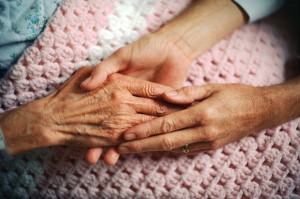 My mother developed Alzheimer’s disease, the most common type of dementia, in her early 60s. Later on, she was diagnosed with an aggressive thyroid cancer that required a surgical opening in her throat called a tracheostomy so that she would not suffocate from the tumor. My father and siblings were naturally distraught and overwhelmed.
My mother developed Alzheimer’s disease, the most common type of dementia, in her early 60s. Later on, she was diagnosed with an aggressive thyroid cancer that required a surgical opening in her throat called a tracheostomy so that she would not suffocate from the tumor. My father and siblings were naturally distraught and overwhelmed.
I was 38 years old at the time and a suddenly single mother with 3 young children. My youngest daughter Joy was 2 years old and in diapers. My family looked to me for help.
As a nurse, I thought I knew the challenges of caring for someone with Alzheimer’s as well as someone with cancer and I was glad to use that knowledge to care for my mother. But, especially at first, it wasn’t easy.
Mom would ask the same questions over and over, have episodes of hostility and paranoia and periodic insomnia. She also became adept at thwarting the safety measures we used to protect her.
Then, one day near the end of my mother’s life, I sat on a sofa holding hands with both Joy, now over 3 years old, and my mom watching Sesame Street on TV. I was struck by the fact that both of them had the exact same expression of happiness on their faces. It was then that I realized how far we all had come and how much I had learned.
Five Things My Mother and My Daughter Taught Me About:
1. Getting things done
I soon realized that both my 2 year old daughter and my mother responded best to one direction at a time and the patience to wait until one action was completed before directing another action.
For example, instead of just saying “brush your teeth” and trying to hurry the action along, directing both of them on just one step at a time time ultimately saved both time and frustration on everyone’s part.
I also found that set routines were comforting to both my mother and daughter despite their obvious differences.
2. Answering questions
Like most people caring for a relative with dementia, I found that answering the same question from my mother over and over again was exhausting. Answering different but incessant questions from my daughter was also difficult at times. So I learned the technique of distraction. For example with my mother, I would interest her in another activity such as folding laundry with me. With my daughter, I would often ask her to “read” a book to me. Judiciously used, this kind of pivot would relieve the increasing tension and make both of them happy.
3. Attitude
I made sure to smile often and establish eye contact with both my mother and my daughter. I would work my name into the conversation when I could see my mom trying to remember who I was and I made sure to often say “I love you” and praise the efforts of both my mother and my daughter. I made sure each had my full attention at that time even when I was in a hurry myself.
4. De-escalation
I found that both people with Alzheimer’s and 2 year olds are prone to sudden meltdowns that are difficult to handle. I discovered that watching for increasing agitation, frustration or the need for a nap and taking preemptive measures could often calm the situation before tempers flared out of control.
5. Music
I always found it fascinating that people with late-stage Alzheimer’s, even those who were rarely verbal, would often start singing when they heard a song they knew. The same is true with young children who naturally delight in songs. Our sing-a-longs were great fun for both my mother and my daughter. “You Are My Sunshine” was a special favorite. My daughter Joy is now an adult and a music teacher.
Best of all, my children still have fond memories of their grandmother after almost 30 years.
A Final Story
This year, some married friends of ours buried the wife’s beloved mother who had Alzheimer’s. They and the rest of the family had worked together to take wonderful care of the mother at home as long as possible and in the nursing home where she finally died.
As the mother’s Alzheimer’s progressed to a later stage, she started to have vivid hallucinations.
One day, the couple made plans to take the mother to her favorite restaurant but she refused to go without the “two little girls over there.” The wife started to tell her mother that she was having hallucinations but her husband gently stopped her. Instead, he told the mother that the little girls weren’t hungry. The mother smiled and immediately got up to go to the restaurant.
The wife later asked me if it was OK to “lie” to her mother. I told her that her mom would probably have been embarrassed and upset to hear that she was having a hallucination. She might have even argued about it.
On the other hand, her husband’s response was both kind and respectful of her mother’s dignity. And, technically, those “two little girls” could not be hungry because they were not real.
To me, that kind of loving attitude from both these friends is inspirational. I wish that it was universal.



